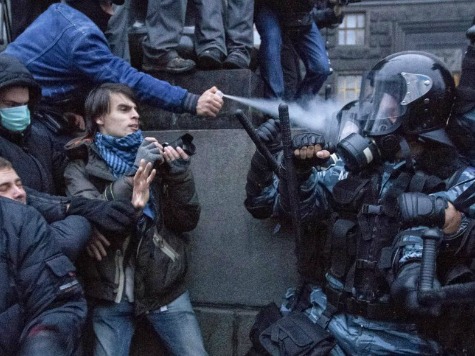
Russia is denying any involvement in Ukraine as its capitol Kiev burns on a nightly basis due to government unrest. Protesters believe Ukrainian President Viktor Yanukovich is a puppet for Russian President Vladimir Putin.
“We do not feel it is justified in any way for us to intervene in the internal affairs of fraternal Ukraine,” Dmitry Peskov, spokesman for Russian president Vladimir Putin, said last week. “This is unacceptable, and Russia has not done it and will not do it. Any decisions taken in Kiev are taken by a sovereign state that has accepted the leadership of the country through a democratic processes. Intervention by any means is unacceptable to us.”
Protesters have been in Independence Square in Kiev since Yanukovich turned down a trade agreement with the European Union in favor of one with Russia. The protests remained peaceful until a few weeks ago when the government started attacking the Catholic Church and rushed through very strict anti-demonstration laws.
Russian Foreign Minister Sergei Larov told the United States not to interfere with Ukraine.
“I told [U.S. Secretary of State] John Kerry that is very important now not to interfere in the process and to avoid any statements that will only heat up the situation,” Lavrov said in an interview with state television news program Vesti v Subbotu, according to Reuters.
“I hoped he heard me,” Lavrov added.
Putin also sent a warning to European countries not to get involved with Ukraine.
“We would prefer some of our European colleagues not to behave so unceremoniously in connection with Ukraine’s crisis, when members of a number of Europe’s governments without any invitations dashed to take part in anti-government demonstrations in a country with which they have diplomatic relations,” he told journalists in Moscow.
“It is simply improper and it is heating up the situation.”
There are many reasons why Europe and Russia are fighting over Ukraine.
Zbigniew Brzezinski, the former national security adviser to United States President Jimmy Carter, once wrote that “without Ukraine, Russia ceases to be an empire, but with Ukraine suborned and then subordinated, Russia automatically becomes an empire.”
Kiev was home to the first Slavic state in the 9th century and Russians consider it their birthplace. In fact, the majority of Ukrainians in the east favor the deal with Russia over the EU. It was a bitter pill to swallow for a lot of Russian elite when Ukraine received its independence in 1991 when the Soviet Union fell apart.
The location is prime for Europe and Russia. Europe receives 25% of their natural gas from Russia and the majority of it travels through Ukraine. The country has 45 million consumers and some of the best soil in Europe. Ukraine is ranked towards the bottom of a list of countries that are easy to do business with, but without Russia influence, this could change. Europe could sell goods and Ukraine could sell Europe some of the best agriculture. The EU is broke and needs more trading partners. Ukraine’s population might help them out.
Ukraine is good for military and national security.
Ukraine is also important for military reasons; the Ukrainian city of Sevastopol is the headquarters for Russia’s Black Sea Fleet. Ukraine’s strategic location as a borderland between Russia and Europe and its proximity to Russia’s own breadbasket and economic heartland in the Volga region make the country key to Russia’s geopolitical strength and, ultimately, its survival.
The European Union could use Ukraine for national security reasons, too. With it they have a defense mechanism against Russia.
Yanukovich reached out to two opposition leaders and offered them top posts in the government. Arseniy Yatsenyuk, leader of the biggest opposition group, was offered the prime minister and boxer-turned-politician Vitali Klitschko the deputy prime minister post. Both of them turned down Yanukovich.

COMMENTS
Please let us know if you're having issues with commenting.